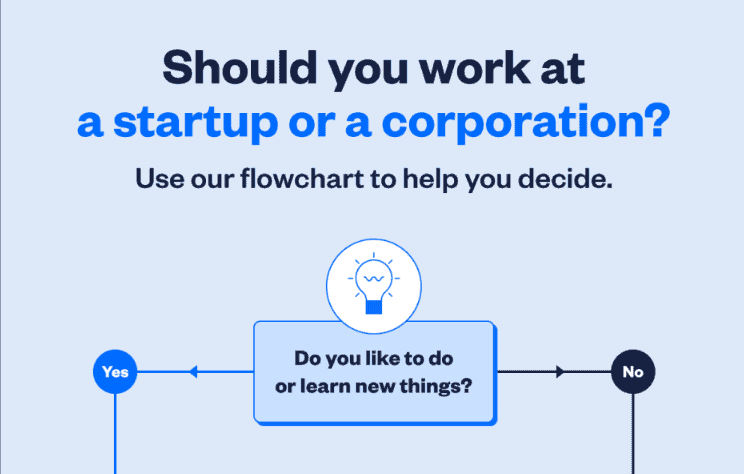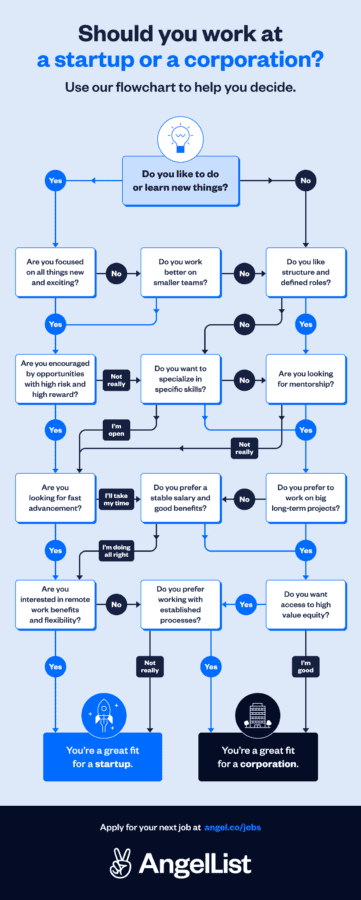Professionals far and wide are faced with the dilemma of choosing between a startup or a corporate job. Deciding between the two can be a difficult task since both have advantageous aspects, but at the end of the day it comes down to finding your fit.
If you’re wondering what’s best for your career, look no further: in this article, we’ll cover signs you should work at a startup, a corporation, and what is the best decision based on where you are in your career.
Startups: What you need to know
Early-stage businesses that are in the first chapter of launching their product or service are called startups. They can vary in size from five to 50 employees, and grow rapidly. Funding from investors or venture capitalists can really help get these companies off the ground and help them break into the industry. Below are some common characteristics of startups.
- Access to pre-IPO equity and stock options
- Smaller teams with independent employees
- Wide breadth of work and tasks
- Less structure than an established company
- Limited mentorship opportunities
Corporations: What to keep in mind
While startups can carry risk, corporations comfort some employees with the stability and predictability they provide. Corporate companies can have hundreds if not thousands of employees, some from all over the world. Keep reading for the draws of corporate jobs.
- Strong leadership and structure
- Larger teams with different departments
- Precise roles and responsibilities in each job
- More mentorship and role models
- Stable benefits and salary package
Signs that you’re a good fit for a startup
Below are some characteristics about yourself to take into consideration that might make you a good fit for startup culture.
- You love to learn and do new things
- The idea of high risk, high reward excites you
- You want to get in on a new opportunity before it’s popular excites you
- Access to stock options and equity is a priority
- You prefer a smaller group of coworkers
- Quick advancement in the company is preferred
- You want to quickly grow your work experience
Signs you might be better off at a corporation
On the other hand, there are certain characteristics you might have which would serve a better fit at a corporate company.
- A stable salary and benefits package appeals to you
- You’re looking for someone to mentor you
- You prefer a larger team with many departments you can learn from
- You want to specialize in a specific industry or skill set
- You like defined roles and structure
Pros and cons of working at a startup
If you’ve never worked at a startup before, you might be wondering what the culture is like. Dive into the pros and cons of startup culture below before you make the next decision in your career.
Pros of startups
- Seeing results fast. Since you’ll be part of a smaller team, you’ll be able to see the results of your work quicker than a bigger company where there is a more established process for product launches or marketing campaign launches.
- Potentially high-value equity. If you cash in on a startup early in its career, you may get a large number of shares that ultimately become high-value as the company grows. This is a huge draw for startup founders and employees.
- More flexibility and autonomy. Many startups are in the tech space, which has allowed for remote work flexibility that gives workers the power to decide how to prioritize their tasks without the oversight of a manager as they would in person.
- Wide breadth of responsibilities. If you’re looking to learn a lot in a short amount of time, a startup job will have you wearing many different hats and learning about different departments you might not otherwise have at a corporate company.
- Leadership opportunities early on. Since you’ll grow incredibly familiar with the startup’s product or service as it grows quickly, you might be able to move up faster in leadership at a startup than you would at a corporate company where it’s harder to get recognized for your contributions.
Cons of startups
- Less structure and organization. If you like structure and defined roles, this is harder to find a startup. Startups that are in the growth stages and have more employees will likely have more defined roles and structures than those that are in their very early stages.
- Fewer mentorship opportunities. If you’re looking for someone to guide you through your job responsibilities and provide leadership, this can be harder at a startup since everyone is wearing many hats and focused on the product or service launches.
- Juggling many tasks at once. Startup employees, especially in the very early stages, have a multitude of tasks that involve getting the business off the ground. This can result in a full workload with many different tasks which can overwhelm those who aren’t excited by it.
When deciding between two types of work environments such as these, it can be difficult to pinpoint what culture will work for you. Ultimately, you’ll want to work somewhere that aligns with your career goals and helps you achieve your dream career. If you’re still not sure what the right fit is, check out this flowchart to help you decide.
This is a guest post written by Mitali Shukla. She is a creative copywriter and marketing specialist based out of Southern California. She has a passion for creating high-quality content across industries from startups to entrepreneurship. In December 2020, she graduated from Chapman University with a Bachelor of Arts in Strategic & Corporate Communication and Sociology.





